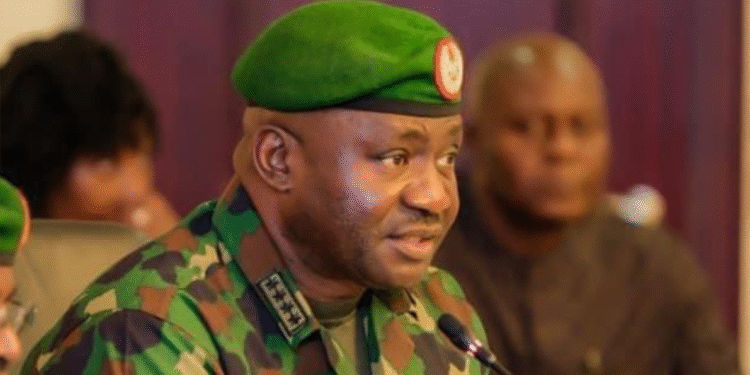The Chief of Defence Staff (CDS), Christopher Musa, says hunger and poverty have become national security threats.
“Insecurity today is not only defined by weapons but also by economic deprivation, food insecurity, and social dislocation,” said Mr Musa said at the opening of the 14th National Security Seminar organised by the Alumni Association of the National Defence College (AANDEC) on Monday in Abuja.
“Hunger and poverty are no longer mere social challenges – they have become national security threats.”
The seminar with the theme: “Combating Hunger and Poverty for Sustainable Peace and Development in Nigeria,” was organised in collaboration with the Office of the National Security Adviser (ONSA) and National Defence College (NDC).
The CDS, represented by the chief of defence training, Rear Adm Ibrahim Shetimma, called for a unified national approach to combating hunger and poverty, stressing their growing impact on Nigeria’s internal security.
Mr Musa noted that the disruption of farming communities and the illegal occupation of farmlands contributed to food inflation, displacement, and mass migration, destabilising the economy and national cohesion.
“The North-Central region, particularly Benue, once considered Nigeria’s food basket, is a clear example of how banditry, displacement, and farmer-herder conflicts have devastated agricultural productivity,’’ he said.
The defence chief called on communities to deny criminals and terrorists sanctuary by supporting intelligence gathering, timely reporting and community vigilance.
The CDS called for urgent investment in grassroots agricultural development and urged the government and stakeholders to reposition farming as a noble and rewarding profession by enhancing access to credit, infrastructure, and market linkages.
“With the migration of rural youth to urban centres, agricultural productivity is declining.
“We must make farming attractive again—not as a last resort, but as a national duty and a prestigious calling,’’ he added.
Mr Musa also praised President Bola Tinubu’s Renewed Hope Agenda, particularly its emphasis on financial autonomy for local governments, which he described as vital for responsive and community-driven development.
“I assure you, the Armed Forces of Nigeria, in collaboration with other security agencies and with the support of the people, remain resolute in overcoming all security threats,” he said.
In his remarks, the president of AANDEC, Retired Air Commodore Darlington Abdullahi, underscored the need for sustained investment in education, economic empowerment and social inclusion as critical non-kinetic responses to Nigeria’s deepening insecurity.
Mr Abdullahi said hunger and poverty were not just humanitarian crises but strategic threats to national stability.
He quoted the timeless wisdom that says “the children of the poor you fail to train will never let your children have peace,” stressing that neglecting the socio-economic wellbeing of the population creates fertile ground for instability and extremism.
“When millions suffer from hunger and poverty, they become vulnerable to exploitation by those with ill intentions.
“We must, therefore, invest in our people, especially in education, livelihoods, and skills development,” he said.
The AANDEC president praised the members of the association, retired military officers and senior public servants, as patriots committed to safeguarding Nigeria’s peace and unity beyond the battlefield.
He advocated for the creation of a dedicated vocational and leadership development centre for widows and children of fallen heroes, describing it as a necessary step in empowering vulnerable populations and promoting national healing.
(NAN)









